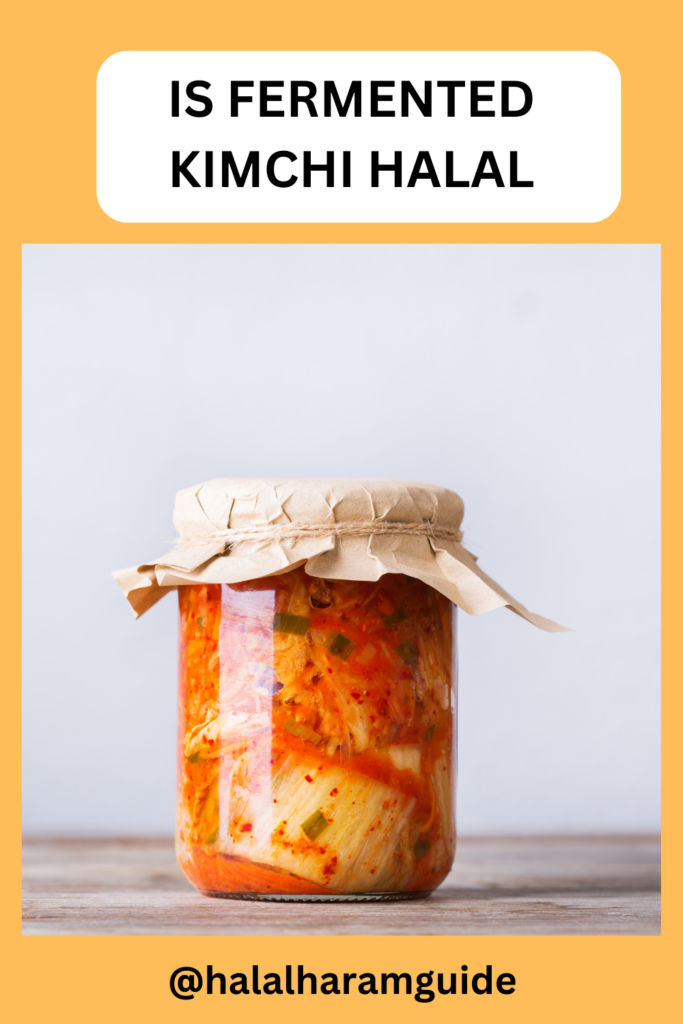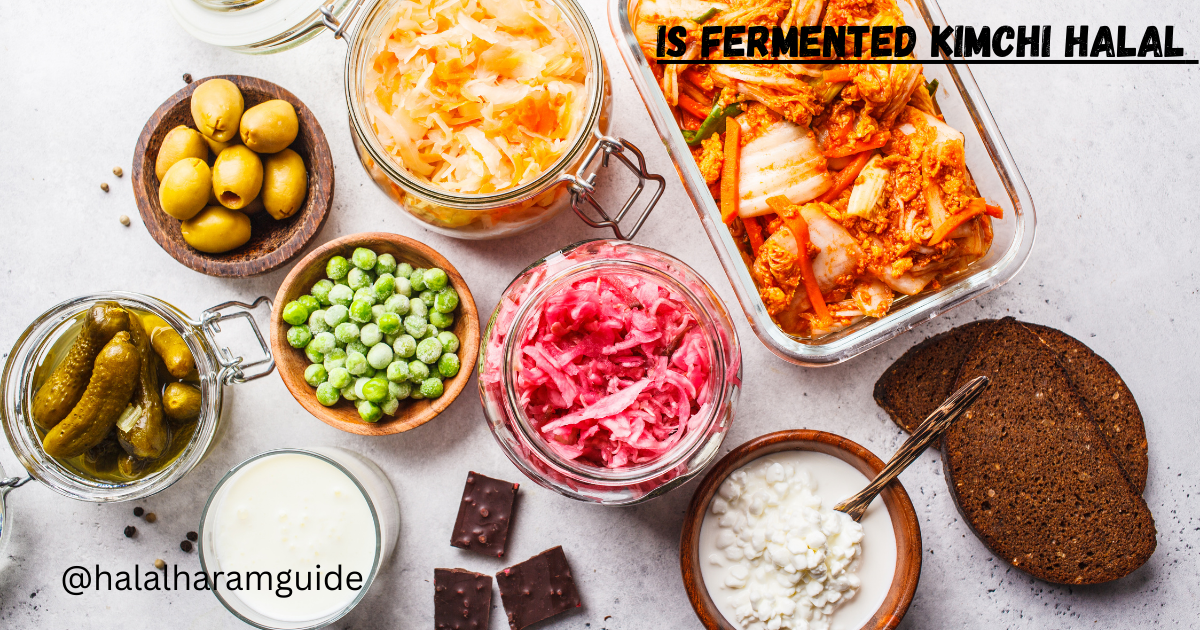Welcome to our blog post where we delve into the intriguing question: Is fermented kimchi halal? In this discussion, we aim to provide you with a straightforward and informative exploration of the halal status of this beloved Korean delicacy.
Whether you’re a fan of its tangy flavors or simply curious about dietary considerations, we’re here to unravel the complexities and shed light on whether fermented kimchi aligns with halal dietary guidelines.
What Is Kimchi?
Kimchi is a traditional Korean dish that has gained international popularity for its unique and flavorful profile. It is essentially a fermented vegetable dish, most commonly made with Napa cabbage and Korean radishes, although there are countless variations.
The process of making kimchi involves salting the vegetables and then combining them with a mixture of seasonings, which typically includes ingredients like garlic, ginger, red pepper flakes, and fish sauce or fermented shrimp paste. These ingredients give kimchi its signature spicy, savory, and umami-rich taste.
Is Fermented Kimchi Halal Or Haram?
Fermented kimchi’s halal or haram status can vary depending on the specific ingredients and preparation methods.
The primary concerns for halal compliance include the use of ingredients like fish sauce or fermented shrimp paste, which may not align with Islamic dietary guidelines, and the potential for cross-contamination during processing.
To ensure the halal status of fermented kimchi, Muslims should seek out brands that use halal-certified ingredients or explore homemade versions with halal-approved substitutions for any non-compliant components.
Additionally, consulting with a knowledgeable religious authority or halal certifying organization can provide clarity on whether a particular fermented kimchi product is permissible for consumption in accordance with Islamic dietary principles.
What Is The Secret Process Behind Fermentation?
Fermentation is a natural process where microorganisms like bacteria, yeast, or fungi convert sugars and other organic compounds into various substances, often with unique flavors and properties.
During fermentation, these microorganisms consume sugars, producing byproducts like acids, alcohol, or gases.
This transformative process not only preserves food but also enhances its taste, texture, and nutritional value. Controlled fermentation is used in the production of a wide range of foods and beverages, from yogurt and cheese to bread and pickles.
Is There Alcohol In Kimchi?
In traditional kimchi recipes, a small amount of alcohol can be produced during the fermentation process as a byproduct of the microbial activity.
However, the alcohol content in kimchi is typically very low, often well below 1%. The primary purpose of fermentation in kimchi is to develop its distinct flavors and enhance its shelf life, rather than to produce alcohol.
Is It Permissible To Eat Kimchi If It Contains Alcohol?
The permissibility of eating kimchi containing trace amounts of alcohol depends on individual interpretation and adherence to Islamic dietary guidelines. In general, small amounts of naturally occurring alcohol as a byproduct of fermentation are considered permissible by some scholars.
Consulting with a knowledgeable religious authority can provide specific guidance based on one’s dietary preferences and religious convictions.
What Makes Fermented Kimchi Acceptable To Followers Of Islam?
Followers of Islam may find fermented kimchi acceptable if it is prepared with halal-certified ingredients, avoids non-halal additives, and undergoes proper fermentation processes that align with Islamic dietary principles.
Ensuring the source of ingredients, the absence of haram components, and the absence of cross-contamination are key factors in making fermented kimchi permissible for Muslims adhering to halal dietary guidelines.
Conclusion
In conclusion, kimchi is a beloved Korean dish made primarily from vegetables like Napa cabbage or Korean radishes, combined with seasonings and then fermented to develop its distinctive flavors.
While pork is not a typical ingredient in traditional kimchi, it is essential to check the specific ingredients and preparation methods of kimchi products to ensure they meet one’s dietary preferences or restrictions, including halal or vegetarian considerations.
Kimchi remains a versatile and flavorful addition to Korean cuisine, enjoyed by people around the world.
FAQ’S
Q1. What Are The Ingredients Of Kimchi?
Kimchi’s core ingredients include Napa cabbage or Korean radishes, salt, and a blend of seasonings, encompassing garlic, ginger, Korean red pepper flakes (gochugaru), sugar, and occasionally fish sauce or fermented shrimp paste.
Additional vegetables like green onions, carrots, and onions may also be added. Water is utilized to create a seasoning paste that, when mixed with the vegetables, undergoes fermentation, resulting in the distinctive, tangy flavors of kimchi.
Q2. Is Kimchi haram in pakistan?
Kimchi itself is not inherently haram in Pakistan or any other country. Whether kimchi is considered halal or haram depends on the specific ingredients used in its preparation.
If the ingredients align with halal dietary guidelines and are free from haram components, then kimchi can be considered halal and permissible for consumption.
Q3. Is Kimchi Cabbage Halal?
Kimchi cabbage can be halal if it is prepared with halal-certified ingredients and follows Islamic dietary guidelines. The cabbage itself, as a vegetable, is generally considered halal in its natural state.
However, it’s essential to ensure that the seasonings and any additional ingredients used in kimchi preparation are halal-compliant and free from haram components to maintain its halal status.
Q4. Is Pork Used In The Production Of Kimchi?
Pork is not typically used in the production of traditional kimchi. Kimchi is a Korean dish primarily made from vegetables, with Napa cabbage or Korean radishes being the most common base ingredients.
However, individuals should always check the specific ingredients and production methods of kimchi products to ensure they align with their dietary preferences or restrictions.
- “Is Lobster Halal? Understanding Its Permissibility”
- “Is Drawing Haram in Islam? Understanding the Perspective”
- “Is Fermented Kimchi Halal? Exploring Kimchi’s Halal Status”
- “Is Collagen Halal? Unveiling the Halal Status of Collagen”
- “Is Wine Vinegar Halal? Unveiling Its Permissibility”


